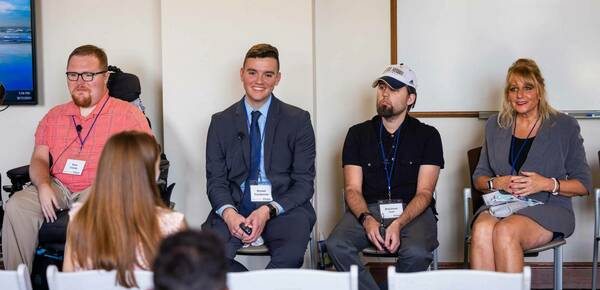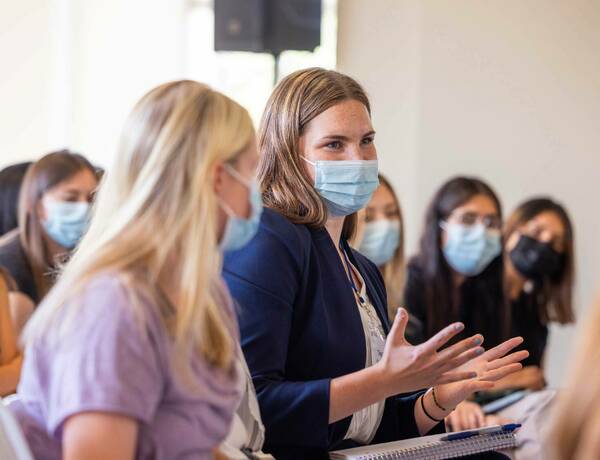
The Minor in Science and Patient Advocacy in collaboration with Dyne Therapeutics hosted the Rare Patient Advocacy Summit, featuring a panel of individuals affected by muscular dystrophies. Sean, Russell, Suzette and BillyDean shared their experiences with a group of students, professors, and practitioners. The summit also heard from a panel of students in the new Minor in Science and Patient Advocacy, as well as a panel of the Dyne Therapeutics executive team.
The summit revealed the importance of patient advocacy for people living with rare disease. The goal of the minor is to spread awareness of rare diseases and help students develop the skills to effectively advocate for patients. This is just the beginning of a new venture to elevate the voices that are often unheard and to support students seeking to develop a practice in advocacy.
Dyne Therapeutics is a leading pharmaceutical company developing innovative treatments for muscular dystrophies with a focus on patient advocacy. Chief Executive Officer Josh Brumm, an alumnus of Notre Dame, agrees that the focus on patient advocacy is a critical aspect of developing new treatments. According to Dyne’s mission, without communication with the affected groups, pharmaceutical companies miss out on the relevant creative and critical information that is necessary to successfully impact the lives of those affected by rare disease. The summit enabled a discourse for rare patients to freely express their concerns, needs, and experiences. The summit further inspired the program, and its people, reminding us all why this work is important.
The Minor in Science and Patient Advocacy is a program within the College of Science that inspires students to understand new perspectives in the process of caring for patients and their families. Those affected by disease often have unique and neglected needs, and the purpose of the program is to bring awareness to these experiences and elevate those voices.

Understanding a patient’s needs allows practitioners the opportunity to affirm that a patient is heard, respected, and considered. This field bridges the gap between ineffective treatments, prolonged suffering, and miscommunications among stakeholders. Patient advocacy provides a balance between clinical research and the interpersonal skills needed to effectively advocate for rare disease patients in multiple areas of treatment, from the development of pharmaceuticals to the appropriate care at home.
Patients and caregivers take on the role of advocacy from a place of necessity. Students of the minor share that their goals are to make a meaningful impact and to empower patients and caregivers to navigate and effectively advocate for their own survival and well-being. The rising class will develop these skills, in the classroom and the community, to ultimately make them effective and informed practitioners.Barbara Calhoun, a co-director of the minor says, “There is a great need to help those patients diagnosed with rare diseases. To be an advocate, you need to completely understand the disease from the molecular or genetic basis of disease to the clinical manifestations that result.”
Sean, one of the guest panelists living with Duchenne, said, “It was an honor to share my story with students that are so invested in the care and advocacy of patients with rare diseases. As someone with a rare disease, it’s encouraging to know that the next generation of clinicians will have a strong understanding of how to treat, care for, and advocate for patients with rare diseases.”